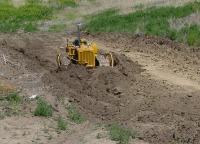- Posts: 104
- Thank you received: 79

ACMOC Membership Benefits
- FREE quarterly magazine filled with content about antique Caterpillar machines
- FREE classified listings
- ACMOC store discounts and specials
- Full Bulletin Board Access
- Marketplace (For Sale/Wanted)
- Technical Library
- Post attachments
$44 /year ELECTRONIC
$60 /year USA
$77 /year International
- Forum
- Antique Caterpillar Machinery Owners Club
- DISCUSSION
- Cat12F something going on in the control box
Cat12F something going on in the control box
I've got the service manual, but cannot find any trouble shooting description of Hanna's symptoms. I have a sinking feeling that I'm going to need to dissemble the control box. I think the front can be removed to see what might be going on.
Way out of my depth on this, but such is life. Grateful for the wisdom of the ACMOC community. I do wish it had happened in the summer, mind you. Working outdoors this time of year is tedious. Ah well.
Please Log in or Create an account to join the conversation.
- trainzkid88
-

- Offline
- Platinum Boarder
- Member
- Posts: 2126
- Thank you received: 794
Please Log in or Create an account to join the conversation.
Yep. Mechanical blade lift and etc. And yep. Doesn't sound good. Will get her good and warm before trying anything again. But last year I had her out in equally cold weather with no issues.yours is still old enough to have mechanical blade mechs isnt it. cuase that doesnt sound good at all. maybe something happening with the dog clutches or has the shafts or pivots partially seized that could happen in such cold temps metals do shrink in cold temps.
Please Log in or Create an account to join the conversation.
ACMOC Member 27 years
D47U 1950 #10164
Cat 112 1949 #3U1457
Cat 40 Scraper #1W-5494
Please Log in or Create an account to join the conversation.
Make certain the "wop" noise is not coming from some shot "U" joints on the short shaft that come off the engine. Easy to see and check on most models.
Good advice. But I had checked those this summer (and replaced a couple of u-joints on the control drive shafts. The noise definitely came from the control box. As I note below, I am wondering about the dog clutches being slow to move due to cold, thick, oil.
Please Log in or Create an account to join the conversation.
Thoughts?
Please Log in or Create an account to join the conversation.
I did notice as the temp drops not just the control box in the cab gets cold but also all the lubes in the bull gears, gear boxes and u-joints gets very thick too. (my trany must have 90w in it.LOL). The increasing resistance to the control mechanism puts a lot of pressure on the shear pins. Ice/water can be in the lubes increasing the resistance while decreasing the lubricating properties of the lubricants. I had a bull gear full of ICE on my Adams 311 Motor Grader once. I was lucky I inspected the gears before I had engaged the circle otherwise I would imagine it would have broken shear pins in the control box or broke weak u-joints.
good luck
ACMOC Member
Traxcavator: 60, 955E 12A08263; 57, 955C 12A04040; 57, 955C 12A03563.
1954 No.12 Diesel Motor Grader 8T14777.
1945 No.12 Diesel Motor Grader 9K9320; 9K9982
1944-46 Adams Model No. 311 Motor Grader
1943 IH T9 Tractor w/ Bullgrader Blade
Attachments:
Please Log in or Create an account to join the conversation.
It has been so long since I looked at mine that I don't remember if a sheared pin can get into a gear.
Not to belabor a point but if one has taken the short telescoping shaft apart, I believe it is possible that the U joints can get misaligned when put back together.
Clean and lighter oil might just solve the problem. Sure worth a try.
ACMOC Member 27 years
D47U 1950 #10164
Cat 112 1949 #3U1457
Cat 40 Scraper #1W-5494
Please Log in or Create an account to join the conversation.
Synthetic oil vs.single and multi viscosity oils :
Synthetic oils are made to hold or suspend the dirt (contaminants) in the oil until it is filtered out,
Synthetic oils also have a lot more detergents in them to help clean internal engine parts to send to the filter.
Synthetic oils are very good at cleaning that is what they were made fo r,
However;
single and multi viscosity oils have a long history of additives from lead to zinc to bees wax but the underlining deference, I see, between the oils is the non-Synthetic oil drops the dirt in the sump (oil pan and nooks n crannies) and it settles and what goes through the filter goes through the filter ... until someone comes along and changes oil or pulls the oil pan.
The conundrum:
If one has been using single viscosity/non-Synthetic oils for thirty er sixty years the gunky hardened dirt in the sump is at rest. Sometimes it is best to let sleeping giants lie. To disturb their slumber may prove to be fatal or at least expensive.
There are other reasons such as seals and filters that need to be addressed.
Conclusion :
If one were to clean and restore the engine, trany or gear box addressing the seal and dirt issues, I see no reason why anyone couldn't use Synthetic oils.
ACMOC Member
Traxcavator: 60, 955E 12A08263; 57, 955C 12A04040; 57, 955C 12A03563.
1954 No.12 Diesel Motor Grader 8T14777.
1945 No.12 Diesel Motor Grader 9K9320; 9K9982
1944-46 Adams Model No. 311 Motor Grader
1943 IH T9 Tractor w/ Bullgrader Blade
Please Log in or Create an account to join the conversation.
- trainzkid88
-

- Offline
- Platinum Boarder
- Member
- Posts: 2126
- Thank you received: 794
and american companies seem to have a love affair with sae 30 oils when much better exists today.
i just had a look online and found out about a product called redline shockproof gear oil its a synthetic and is thin like light engine oil but works like 75w140 gear oil.
made specifically for dog clutch transmission in racing applications. they have 3 grades superlight, light and heavy available in the quart or gallon. from all good performance and racing suppliers. might be just the stuff.
Please Log in or Create an account to join the conversation.
- Forum
- Antique Caterpillar Machinery Owners Club
- DISCUSSION
- Cat12F something going on in the control box
ACMOC
Antique Caterpillar Machinery Owners Club
1115 Madison St NE # 1117
Salem, OR 97301
support@acmoc.org
"I became a member recently because the wealth of knowledge here is priceless."
- Chris R
"I also joined a year ago. had been on here a couple of times as a non-member and found the info very helpful so I got a one year subscription (not very expensive at all) to try it out. I really like all the resources on here so I just got a three year. I think its a very small price for what you can get out of this site."
- Jason N




